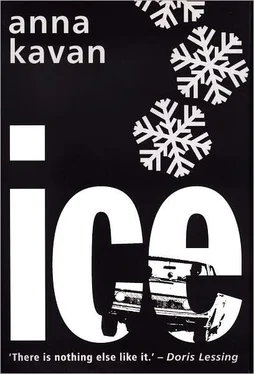Somewhere high up in the room, where I could not see it, a bell rang. A superior, unimplicated voice stated: ‘A psychopath is not an acceptable witness.’
I was taken away, locked in a cell for seventeen hours. In the early morning they released me without explanation. In the meantime, the ship had gone, and with it my luggage. I was stranded with only the clothes I was wearing. Luckily, I had not been deprived of either my passport or my wallet, and was well provided with money.
I had a shave, a wash and brush up, and looked carefully at my reflexion. I needed a clean shirt, but the shops were not yet open; I would buy one later and change. For the moment my appearance was passable, or would be when I had got rid of the dead carnation. I meant to throw it into the gutter as I left the barber’s shop, but a boy just outside offered to clean my shoes, and while he did so I asked him which was the best café. He pointed out one further along the same street; I walked on, liked the look of it, and sat down at one of the tables outside in the sun. At that hour the place was deserted. The solitary waiter on duty brought coffee and rolls on a tray, then returned to the dark interior, leaving me there alone. I drank the coffee, wondered what to do next, watched the passers-by: there were not many of them so early.
A girl went past carrying a basket of flowers, reminding me that, in the end, I had not disposed of the carnation. I tried to pull it out of my buttonhole, but the stem had been securely pinned by the steward. I turned back my lapel, peered down, felt about for the pin. Someone said: ‘Let me do that for you.’ I looked up; the flower girl was smiling at me. I seemed to have seen her face somewhere, I felt I already knew her and liked her. Having removed the carnation neatly, she prepared to replace it with one exactly the same from her basket. I was on the point of saying I did not want it, when something occurred to me and I kept silent. She fixed the fresh flower in my buttonhole and continued to stand beside me, though not as if she was merely waiting for payment. It looked as if my idea was correct, but I said nothing in case I was mistaken. I knew I had been right when she asked: ‘Is there anything else you’d like me to do?’ I glanced round. The other tables were still deserted, the people on the pavement were out of earshot. She had put down her basket on a chair; I pretended to examine the flowers, picking up one bunch after another. To anyone watching, even through field-glasses, we would have appeared to be conducting a normal transaction. I said, ‘Certainly;’ though I wondered if she…. But I had to find out without delay what had been going on in the world. ‘I’ve been at sea; out of touch. There are lots of things you can tell me.’
I asked cautious questions, trying not to show the extent of my ignorance of the latest developments. It appeared that the situation at home was obscure and alarming, no precise information was coming through, the full extent of the disaster was not yet known. The warden of a northern country had escaped to the interior and joined forces with one of the various warlords, between whom hostilities had broken out.
I went on questioning her. She was always polite and friendly, and tried to be helpful. But her answers grew vague, she seemed afraid to commit herself. When one or two people drifted into the café and sat down near us, she said in a whisper: ‘You’ll have to discuss these matters with somebody higher up. Do you want me to arrange it?’ I agreed at once, but was rather sceptical about her power to do this. She told me to wait, picked up her basket, and rushed off down the street, half running. I thought I had probably seen the last of her, but ordered more coffee, waited; I had nothing else to do. The news she had given me of the warden’s escape had relieved my mind, up to a point; it seemed likely, though by no means certain, that he had taken the girl with him. Time passed. There were plenty of people about now. I watched the street for my informant’s return. Just as I had decided she was not coming back, I saw her hurrying towards me between the passers-by. As she came to my table she called out: ‘Here are the violets you wanted. I had to go all the way to the flower market for them. I’m afraid they’re rather expensive.’ She was out of breath, but made her voice sound clear and gay for the benefit of the people around us. I saw that it would be no good trying to persuade her to stay, and asked: ‘How much?’ She named a sum, I handed over the money. She thanked me with a charming smile, darted away, and disappeared in the crowd.
The stalks of the violets were wrapped in paper with words written on it. I was told where to find the man who might help me. The message was to be destroyed immediately. I bought a canvas bag with leather handles and straps to hold a few necessities, then booked at a hotel. When I had bathed and changed, I went to the office of the man named on the paper, who saw me at once. He too was wearing a red carnation. I should have to be careful.
I went straight to the point, there was no object in prevaricating. Naming the town from which the warden was operating, I asked if it was possible for me to get there. ‘No. Fighting is going on in the area, night raids on the town. No foreigners allowed in.’ ‘No exceptions?’ He shook his head. ‘Anyway, there’s no transport except for official personnel.’ After all these negative statements, I could only say: ‘Then you advise me to give up the idea?’ ‘Officially speaking, yes.’ He looked at me slyly. ‘But not necessarily.’ His expression was more encouraging. ‘There’s just a chance I may be able to help you. Anyway, I’ll see what can be done. But don’t count on it. It will probably be a few days before I have anything to report.’ I thanked him. We stood up and shook hands. He promised to notify me immediately he had any news.
I felt bored and restless. I had nothing to do. On the surface, the life of the town appeared normal, but underneath it was coming gradually to a standstill. The news from the north was scanty, confused, frightening. I realized that the destruction must have been on a gigantic scale. Little could have survived. The local broadcasters were cheerfully reassuring. It was the official policy, the population had to be kept calm. But these men actually seemed to believe their country would escape the cataclysm. I knew no country was safe, no matter how far removed from the present devastation, which would spread and spread, and ultimately cover the entire planet. Meanwhile, universal unrest was inevitable. It was the worst possible sign that war had already started, even though on a minor scale. That the more responsible governments were doing their utmost to pacify the belligerents only stressed the explosive nature of the situation, and the ominous threat of all-out warfare augmenting the present catastrophe. My anxiety about the girl, which had subsided slightly, revived again. She had gained nothing by escaping the destruction of one country, if she had gone to another about to engage in a full scale war. I tried to believe the warden had sent her to safety, but knew too much about him to feel sure of that. It was absolutely essential for me to see him; otherwise I would never find out what had happened to her. I spent the evening in different bars, listening to the talk. His name was often mentioned, occasionally as a traitor to his own people, more frequently as a new, powerful, unknown influence on the war issue, a significant figure, a man to watch.
First thing in the morning the telephone rang in my room: someone wanted to see me. I said the person was to come up, hoping for a message from the official. ‘Hullo.’ The flower girl entered, smiling and unselfconscious. She saw my surprise. ‘Forgotten me already?’ I said I had not expected her here. She looked surprised now. ‘But you know it’s part of my job to bring your flower every morning.’ I kept quiet while she fixed the carnation. It was fatally easy to show my ignorance of the organization to which she belonged. I was curious about it, but afraid of giving myself away. It occurred to me that, by spending more time with her, I might pick up information without asking questions. Besides, she was young and attractive, I liked her natural, matter-of-fact behaviour. It would relieve the boredom.
Читать дальше












